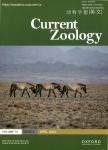How does male-male competition generate negative frequency-dependent selection and disruptive selection during speciation?
How does male-male competition generate negative frequency-dependent selection and disruptive selection during speciation?作者机构:Department of Biology Central Michigan University Mount Pleasant MI 48859 USA
出 版 物:《Current Zoology》 (动物学报(英文版))
年 卷 期:2018年第64卷第1期
页 面:89-99页
核心收录:
学科分类:0710[理学-生物学] 07[理学] 0905[农学-畜牧学] 0906[农学-兽医学] 070203[理学-原子与分子物理] 071002[理学-动物学] 0702[理学-物理学]
主 题:男性 竞争 分裂 频率 否定 形成期 配偶选择 自然选择
摘 要:Natural selection has been shown to drive population differentiation and speciation. The role of sexual selection in this process is controversial; however, most of the work has centered on mate choice while the role of male-male competition in speciation is relatively understudied. Here, we outline how male-male competition can be a source of diversifying selection on male competitive phenotypes, and how this can contribute to the evolution of reproductive isolation. We highlight how negative frequency-dependent selection (advantage of rare phenotype arising from stronger male-male competition between similar male phenotypes compared with dissimilar male phenotypes) and disruptive selection (advantage of extreme phenotypes) drives the evolution of diversity in competitive traits such as weapon size, nuptial coloration, or aggressiveness. We underscore that male-male competition interacts with other life-history functions and that variable male competitive phenotypes may represent alternative adaptive options. In addition to competition for mates, aggressive interference competition for ecological resources can exert selection on competitor signals. We call for a better integration of male-male competition with ecological interference competition since both can influence the process of speciation via comparable but distinct mechanisms. Altogether, we present a more comprehensive framework for studying the role of male-male competition in speciation, and emphasize the need for better integration of insights gained from other fields studying the evolutionary, behavioral, and physiological consequences of agonistic interactions.



